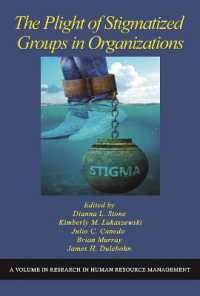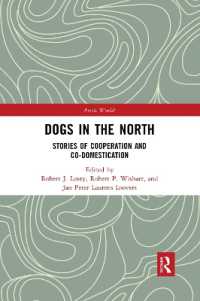- ホーム
- > 洋書
- > 英文書
- > Literary Criticism
Full Description
An international bestseller and the inspiration for a blockbuster film series, Suzanne Collins's dystopian, young adult trilogy The Hunger Games has also attracted attention from literary scholars. While much of the criticism has focused on traditional literary readings, this innovative collection explores the phenomena of place and space in the novels--how places define people, how they wield power to create social hierarchies, and how they can be conceptualized, carved out, imagined and used. The essays consider wide-ranging topics: the problem of the trilogy's Epilogue; the purpose of the love triangle between Katniss, Gale and Peeta; Katniss's role as "mother"; and the trilogy as a textual "safe space" to explore dangerous topics. Presenting the trilogy as a place and space for multiple discourses--political, social and literary--this work assertively places The Hunger Games in conversation with the world in which it was written, read, and adapted.
Contents
Table of Contents
Acknowledgments
Introduction: Taking Up and Entering Critical Space
Part I: Identifying and Challenging Narrative Spaces
Transgressing the Text and Playing Narrative Games: Katniss's Narrative, "Real or Not Real?" delete delete(Julie Elizabeth Tyler)
Tipping the Odds Ever in Her Favor: An Exploration of Narrative Control and Agency in the Novel and Film delete(Anne M. Canavan and Sarah N. Petrovic)
Part II: Provoking Change and Creating Radical Spaces
Katniss and Her Boys: Male Readers, the Love Triangle and
Identity Formation delete(Whitney Elaine Jones)
The Making of the Citizen and the Politics of Maturation (Susan Shau Ming Tan)
Part III: Experiencing Trauma in Safe Spaces
The Privileged Reader as Capitol and Learning Sympathy through Narrative delete(Ann M. M. Childs)
Recreating the Holocaust: YA Dystopia and the Young Jewish Reader (Adam Levin)
Part IV: Popular Responses in Actual Spaces
"I have a kind of power I never knew I possessed": Transformative
Motherhood and Maternal Influence delete (Katie Arosteguy)
Performing the Capitol in Digital Spaces: The Punitive Gaze of the
Panopticon Among Fans and Critics (Deidre Anne Evans Garriott)
Creating a New Ethics: Student Responses, Reality Television and
Audience Awareness delete delete(Linda J. Rice and Katie Wrabel)
Part V: Envisioning Future Spaces
Outside the Seam: The Construction of and Relationship to Panem's Nature delete delete(Carissa Ann Baker)
Political Muttations: "Real or Not Real?" delete delete(Bruce Martin)
Conclusion: Where Can We Go and What Can We Disrupt from Here?
About the Contributors
Index







